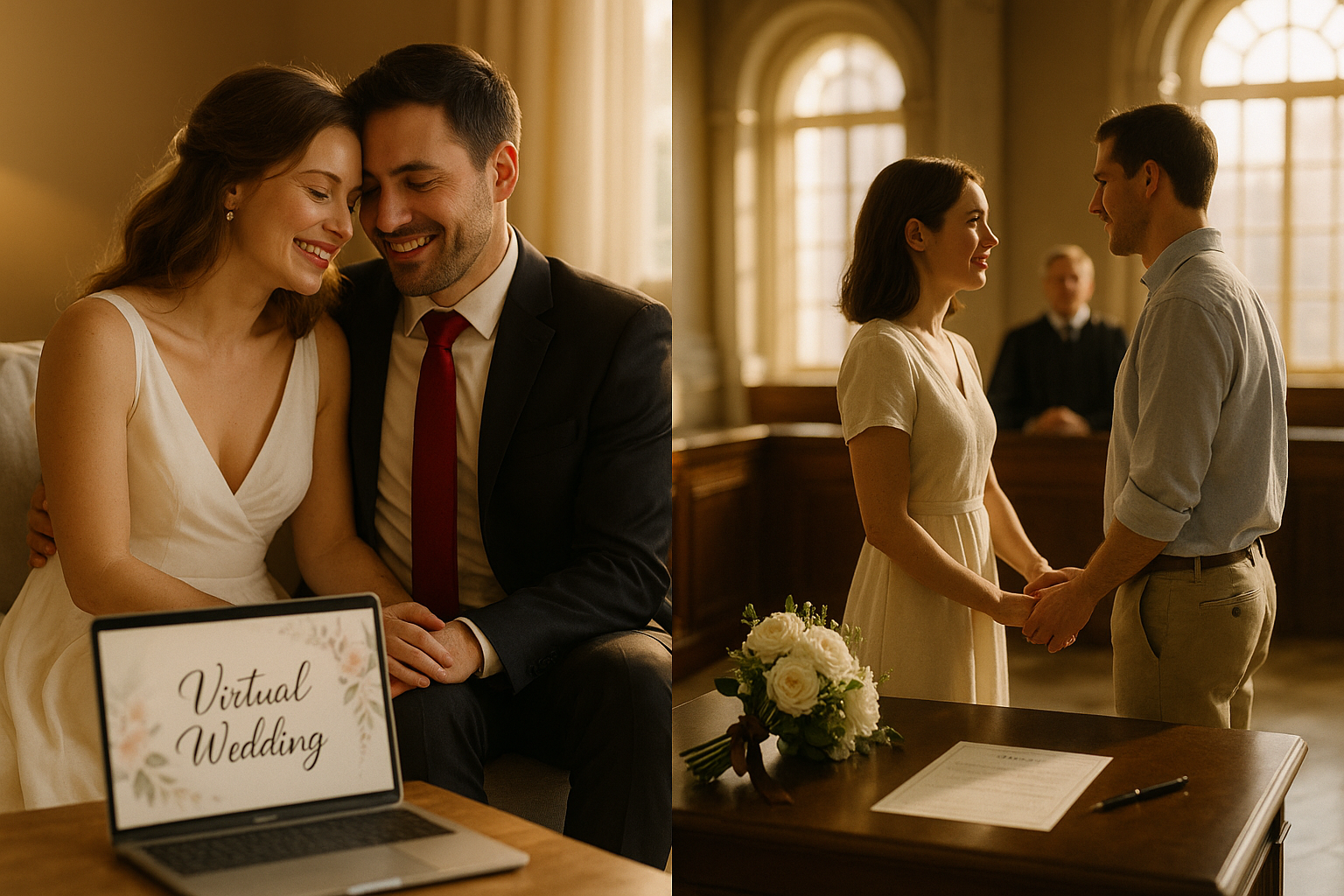Deciding how to tie the knot is a significant step in your journey together. With the rise of technology and changing traditions, couples now have more options than ever. Two popular choices are virtual weddings and courthouse weddings. Let’s explore the pros and cons of each to help you make an informed decision.
Understanding Virtual Weddings
A virtual wedding allows couples to get married online, often via platforms like Zoom. This option gained popularity during the pandemic and continues to be a viable choice for many.
Pros of Virtual Weddings
- Cost-Effective: Virtual weddings eliminate expenses related to venues, catering, and large guest lists, making them budget-friendly.
- Inclusive: Guests from around the world can attend without the need for travel, ensuring everyone you love can be part of your special day.
- Flexible Scheduling: Without the need to book physical venues, you have more freedom to choose a date and time that suits you.
Cons of Virtual Weddings
- Technical Challenges: Internet connectivity issues or platform glitches can disrupt the ceremony.
- Lack of Physical Presence: The absence of in-person interactions may make the event feel less intimate.
- Legal Considerations: Not all jurisdictions recognize virtual marriages, so it’s essential to verify the legal status in your area.
Understanding Courthouse Weddings
A courthouse wedding, also known as a civil ceremony, is conducted by a judge or justice of the peace in a government building. It’s a straightforward and traditional method to legalize your union.
Pros of Courthouse Weddings
- Affordability: Courthouse ceremonies are typically low-cost, involving minimal fees.
- Simplicity: With less planning required, courthouse weddings reduce the stress associated with organizing a large event.
- Quick Process: These ceremonies can often be scheduled on short notice, ideal for couples eager to marry promptly.
Cons of Courthouse Weddings
- Limited Guest List: Space constraints may restrict the number of attendees, which can be a drawback if you wish to include many loved ones.
- Minimal Personalization: The formal setting may limit opportunities to customize the ceremony to reflect your personalities.
- Restricted Scheduling: Courthouse weddings are typically held during business hours, which might not align with your preferred timing.
Making Your Decision
When choosing between a virtual wedding and a courthouse ceremony, consider the following factors:
- Budget: Both options are cost-effective, but virtual weddings may offer more flexibility in terms of expenses.
- Guest Inclusion: If having a large number of guests is important, a virtual wedding allows for broader participation.
- Personalization: Reflect on how much you want to customize your ceremony. Virtual weddings may offer more opportunities for personalization.
- Legal Requirements: Ensure that your chosen method is legally recognized in your jurisdiction.
FAQs
1. Are virtual weddings legally recognized?
Legal recognition of virtual weddings varies by jurisdiction. It’s crucial to check local laws to ensure your marriage is valid.
2. How many guests can attend a courthouse wedding?
Guest limits depend on the specific courthouse’s policies and space availability. Contact your local courthouse for exact numbers.
3. Can we have a reception after a courthouse wedding?
Absolutely! Many couples choose to host a reception or celebration after the ceremony to include more friends and family.
4. What are the technical requirements for a virtual wedding?
You’ll need a reliable internet connection, a device with a camera and microphone, and a platform to host the ceremony, such as Zoom.
5. How do we obtain a marriage license for a virtual wedding?
The process varies by location. Some areas offer online applications, while others may require in-person visits. Research your local requirements well in advance.
Choosing between a virtual wedding and a courthouse ceremony depends on your personal preferences, circumstances, and priorities. Both options offer unique advantages, so consider what aligns best with your vision for your special day.
For more information on planning your wedding, feel free to contact us. We’re here to help make your wedding day as special and seamless as possible.




